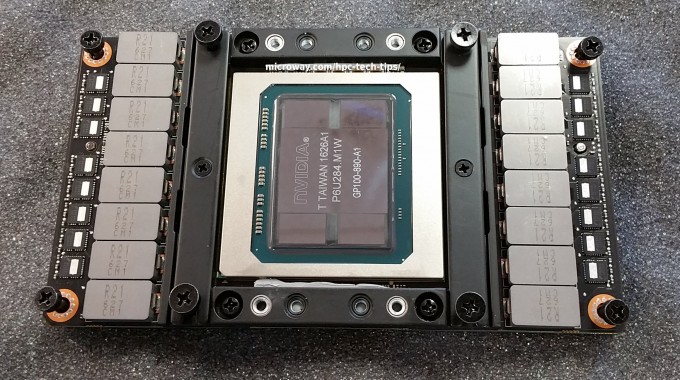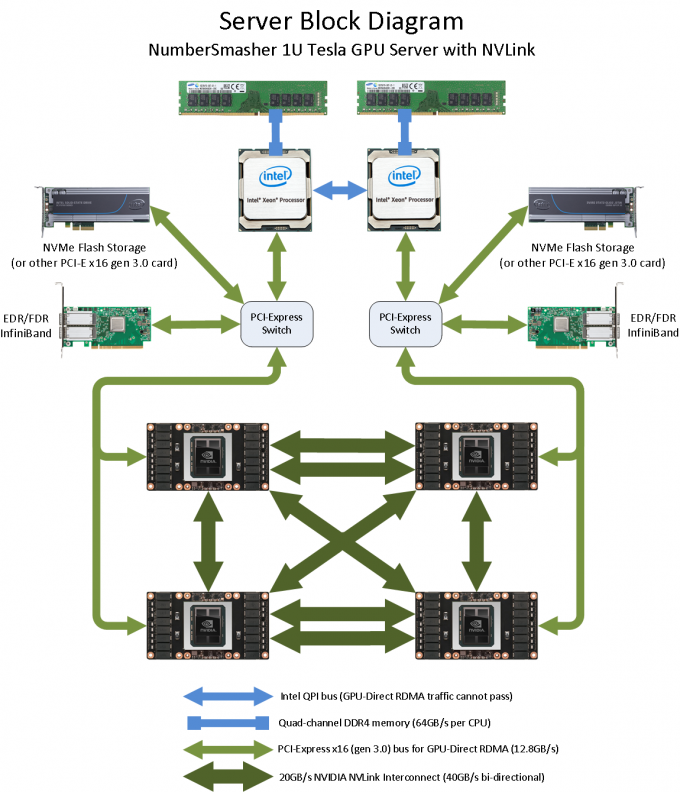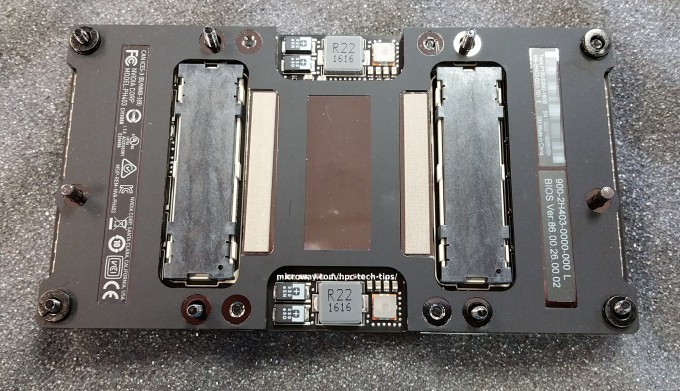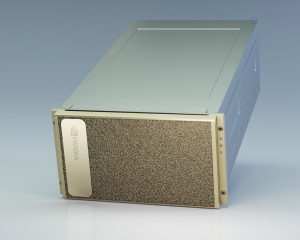The NVIDIA Tesla P100 NVLink GPUs are a big advancement. For the first time, the GPU is stepping outside the traditional “add in card” design. No longer tied to the fixed specifications of PCI-Express cards, NVIDIA’s engineers have designed a new form factor that best suits the needs of the GPU. With their SXM2 design, NVIDIA can run GPUs to their full potential.
One of the biggest changes this allows is the NVLink interconnect, which allows GPUs to operate beyond the restrictions of the PCI-Express bus. Instead, the GPUs communicate with one another over this high-speed link. Additionally, these new “Pascal” architecture GPUs bring improvements including higher performance, faster connectivity, and more flexibility for users & programmers.
There is variety in the new line-up of GPU products. For the Tesla P100 GPU model, there are three separate paths to be considered:
- Tesla P100 PCI-E GPUs
- Tesla P100 NVLink GPUs (with PCI-E connectivity to the host) (this post)
- Tesla P100 NVLink GPUs (with NVLink connectivity to the host)
Highlights of the new Tesla P100 NVLink GPUs include:
- Up to 5.3 TFLOPS double- and 10.6 TFLOPS single-precision floating-point performance
- 16GB of on-die HBM2 CoWoS GPU memory, with bandwidths up to 732GB/s
- 80GB/s NVLink between GPUs boosts bandwidth between the Tesla P100 GPUs
- High-speed, on-die GPU memory provides a 3X improvement over older GPUs
- Pascal Unified Memory allows applications to directly access the memory of all GPUs and all of system memory
Improved Data Transfer Speeds
The NVLink connection on Tesla P100 GPUs has a theoretical peak throughput of 80GB/s (160GB/s bi-directional). However, that connectivity is only between GPUs. The GPUs still communicate via PCI-Express when transferring data to and from the host (via PCI-E x16 generation 3.0). The high-speed NVLink connection is only for data transfers directly between the GPUs.
Device <-> Device Tesla P100 NVLink Performance
Below is a section of output from NVIDIA’s GPU peer-to-peer (P2P) utility, which is included with CUDA 8.0. The results summarize the throughput (in gigabytes per second) and latency (in microseconds) when sending messages between any pair of GPUs.
It’s important to understand that the test below was run on a system with four Tesla GPUs. On each GPU, the available 80GB/s bandwidth was divided up so that connections could be made to the three other GPUs. The links are divided such that each GPU has two 20GB/s links and one 40GB/s link (see diagram below).
[P2P (Peer-to-Peer) GPU Bandwidth Latency Test]
Device: 0, Tesla P100-SXM2-16GB, pciBusID: 6, pciDeviceID: 0, pciDomainID:0
Device: 1, Tesla P100-SXM2-16GB, pciBusID: 7, pciDeviceID: 0, pciDomainID:0
Device: 2, Tesla P100-SXM2-16GB, pciBusID: 84, pciDeviceID: 0, pciDomainID:0
Device: 3, Tesla P100-SXM2-16GB, pciBusID: 85, pciDeviceID: 0, pciDomainID:0
...
Unidirectional P2P=Enabled Bandwidth Matrix (GB/s)
D\D 0 1 2 3
0 449.69 18.45 18.45 36.72
1 18.44 450.92 36.70 18.44
2 18.45 36.70 450.37 18.44
3 36.71 18.44 18.44 447.34
...
P2P=Enabled Latency Matrix (us)
D\D 0 1 2 3
0 3.66 9.25 9.31 9.67
1 9.49 3.65 10.04 9.05
2 9.85 10.13 3.13 9.79
3 10.06 11.41 9.97 3.54
As the results show, a 20GB/s Tesla P100 NVLink will provide ~18GB/s in practice. A 40GB/s Tesla P100 NVLink will provide ~36GB/s. Latency between GPUs is 9~10 microseconds. The results were gathered on our 1U NumberSmasher Server with four Tesla P100 NVLink GPUs, which is also available in our Test Drive cluster. The architectural design of this particular platform is:
Host <-> Device Performance
Transfers between system memory and the GPU are still via PCI-Express and will perform similarly to previous-generation “Kepler” and “Maxwell” GPUs. With Tesla P100, you will be able to achieve transfers up to ~12.8GB/s between the host and the GPU:
[root@node2 ~]# ./bandwidthTest --memory=pinned --device=0 [CUDA Bandwidth Test] - Starting... Running on... Device 0: Tesla P100-SXM2-16GB Quick Mode Host to Device Bandwidth, 1 Device(s) PINNED Memory Transfers Transfer Size (Bytes) Bandwidth(MB/s) 33554432 11463.7 Device to Host Bandwidth, 1 Device(s) PINNED Memory Transfers Transfer Size (Bytes) Bandwidth(MB/s) 33554432 12868.0 Device to Device Bandwidth, 1 Device(s) PINNED Memory Transfers Transfer Size (Bytes) Bandwidth(MB/s) 33554432 446271.0 Result = PASS
Technical Details
Below are the technical details reported by nvidia-smi. Note that “Pascal” Tesla P100 GPUs now include fully integrated memory ECC support that is always enabled (memory performance in previous generations could be improved by disabling ECC).
[root@node2 ~]# nvidia-smi -a -i 0
==============NVSMI LOG==============
Timestamp : Tue Dec 6 16:30:58 2016
Driver Version : 367.48
Attached GPUs : 1
GPU 0000:06:00.0
Product Name : Tesla P100-SXM2-16GB
Product Brand : Tesla
Display Mode : Disabled
Display Active : Disabled
Persistence Mode : Enabled
Accounting Mode : Enabled
Accounting Mode Buffer Size : 1920
Driver Model
Current : N/A
Pending : N/A
Serial Number : 032311609xxxx
GPU UUID : GPU-70ba5857-9613-1213-c5f5-3b201233xxxx
Minor Number : 0
VBIOS Version : 86.00.26.00.02
MultiGPU Board : No
Board ID : 0x600
GPU Part Number : 900-2H403-0000-000
Inforom Version
Image Version : H403.0201.00.04
OEM Object : 1.1
ECC Object : 4.1
Power Management Object : N/A
GPU Operation Mode
Current : N/A
Pending : N/A
GPU Virtualization Mode
Virtualization mode : None
PCI
Bus : 0x06
Device : 0x00
Domain : 0x0000
Device Id : 0x15F910DE
Bus Id : 0000:06:00.0
Sub System Id : 0x116B10DE
GPU Link Info
PCIe Generation
Max : 3
Current : 3
Link Width
Max : 16x
Current : 16x
Bridge Chip
Type : N/A
Firmware : N/A
Replays since reset : 0
Tx Throughput : 0 KB/s
Rx Throughput : 0 KB/s
Fan Speed : N/A
Performance State : P0
Clocks Throttle Reasons
Idle : Active
Applications Clocks Setting : Not Active
SW Power Cap : Not Active
HW Slowdown : Not Active
Sync Boost : Not Active
Unknown : Not Active
FB Memory Usage
Total : 16276 MiB
Used : 0 MiB
Free : 16276 MiB
BAR1 Memory Usage
Total : 16384 MiB
Used : 2 MiB
Free : 16382 MiB
Compute Mode : Default
Utilization
Gpu : 0 %
Memory : 0 %
Encoder : 0 %
Decoder : 0 %
Ecc Mode
Current : Enabled
Pending : Enabled
ECC Errors
Volatile
Single Bit
Device Memory : 0
Register File : 0
L1 Cache : N/A
L2 Cache : 0
Texture Memory : 0
Texture Shared : 0
Total : 0
Double Bit
Device Memory : 0
Register File : 0
L1 Cache : N/A
L2 Cache : 0
Texture Memory : 0
Texture Shared : 0
Total : 0
Aggregate
Single Bit
Device Memory : 0
Register File : 0
L1 Cache : N/A
L2 Cache : 0
Texture Memory : 0
Texture Shared : 0
Total : 0
Double Bit
Device Memory : 0
Register File : 0
L1 Cache : N/A
L2 Cache : 0
Texture Memory : 0
Texture Shared : 0
Total : 0
Retired Pages
Single Bit ECC : 0
Double Bit ECC : 0
Pending : No
Temperature
GPU Current Temp : 40 C
GPU Shutdown Temp : 85 C
GPU Slowdown Temp : 82 C
Power Readings
Power Management : Supported
Power Draw : 34.89 W
Power Limit : 300.00 W
Default Power Limit : 300.00 W
Enforced Power Limit : 300.00 W
Min Power Limit : 150.00 W
Max Power Limit : 300.00 W
Clocks
Graphics : 405 MHz
SM : 405 MHz
Memory : 715 MHz
Video : 835 MHz
Applications Clocks
Graphics : 1480 MHz
Memory : 715 MHz
Default Applications Clocks
Graphics : 1328 MHz
Memory : 715 MHz
Max Clocks
Graphics : 1480 MHz
SM : 1480 MHz
Memory : 715 MHz
Video : 1480 MHz
Clock Policy
Auto Boost : N/A
Auto Boost Default : N/A
Processes : None
The latest NVIDIA GPU architectures support large numbers of clock speeds, as well as automated boosting of the clock speed (when power and thermals allow). Administrators can also set specific power consumption limits and monitor the clock speeds (including explanations for any reasons the clocks are running at a lower speed).
[root@node2 ~]# nvidia-smi -q -d SUPPORTED_CLOCKS -i 0
==============NVSMI LOG==============
Timestamp : Tue Dec 6 16:39:20 2016
Driver Version : 367.48
Attached GPUs : 4
GPU 0000:06:00.0
Supported Clocks
Memory : 715 MHz
Graphics : 1480 MHz
Graphics : 1468 MHz
Graphics : 1455 MHz
Graphics : 1442 MHz
Graphics : 1430 MHz
Graphics : 1417 MHz
Graphics : 1404 MHz
Graphics : 1392 MHz
Graphics : 1379 MHz
Graphics : 1366 MHz
Graphics : 1354 MHz
Graphics : 1341 MHz
Graphics : 1328 MHz
Graphics : 1316 MHz
Graphics : 1303 MHz
Graphics : 1290 MHz
Graphics : 1278 MHz
Graphics : 1265 MHz
Graphics : 1252 MHz
Graphics : 1240 MHz
Graphics : 1227 MHz
Graphics : 1215 MHz
Graphics : 1202 MHz
Graphics : 1189 MHz
Graphics : 1177 MHz
Graphics : 1164 MHz
Graphics : 1151 MHz
Graphics : 1139 MHz
Graphics : 1126 MHz
Graphics : 1113 MHz
Graphics : 1101 MHz
Graphics : 1088 MHz
Graphics : 1075 MHz
Graphics : 1063 MHz
Graphics : 1050 MHz
Graphics : 1037 MHz
Graphics : 1025 MHz
Graphics : 1012 MHz
NVIDIA deviceQuery on Tesla P100 NVLink 16GB GPU
Each new GPU generation brings tweaks to the design. The output below, from the CUDA 8.0 SDK samples, shows additional details of the architecture and capabilities of the “Pascal” Tesla P100 NVLink GPU accelerators. Take note of the new Compute Capability 6.0, which is what you’ll want to target if you’re compiling your own CUDA code.
deviceQuery Starting...
CUDA Device Query (Runtime API) version (CUDART static linking)
Detected 4 CUDA Capable device(s)
Device 0: "Tesla P100-SXM2-16GB"
CUDA Driver Version / Runtime Version 8.0 / 8.0
CUDA Capability Major/Minor version number: 6.0
Total amount of global memory: 16276 MBytes (17066885120 bytes)
(56) Multiprocessors, ( 64) CUDA Cores/MP: 3584 CUDA Cores
GPU Max Clock rate: 405 MHz (0.41 GHz)
Memory Clock rate: 715 Mhz
Memory Bus Width: 4096-bit
L2 Cache Size: 4194304 bytes
Maximum Texture Dimension Size (x,y,z) 1D=(131072), 2D=(131072, 65536), 3D=(16384, 16384, 16384)
Maximum Layered 1D Texture Size, (num) layers 1D=(32768), 2048 layers
Maximum Layered 2D Texture Size, (num) layers 2D=(32768, 32768), 2048 layers
Total amount of constant memory: 65536 bytes
Total amount of shared memory per block: 49152 bytes
Total number of registers available per block: 65536
Warp size: 32
Maximum number of threads per multiprocessor: 2048
Maximum number of threads per block: 1024
Max dimension size of a thread block (x,y,z): (1024, 1024, 64)
Max dimension size of a grid size (x,y,z): (2147483647, 65535, 65535)
Maximum memory pitch: 2147483647 bytes
Texture alignment: 512 bytes
Concurrent copy and kernel execution: Yes with 2 copy engine(s)
Run time limit on kernels: No
Integrated GPU sharing Host Memory: No
Support host page-locked memory mapping: Yes
Alignment requirement for Surfaces: Yes
Device has ECC support: Enabled
Device supports Unified Addressing (UVA): Yes
Device PCI Domain ID / Bus ID / location ID: 0 / 6 / 0
Compute Mode:
< Default (multiple host threads can use ::cudaSetDevice() with device simultaneously) >
[...]
> Peer access from Tesla P100-SXM2-16GB (GPU0) -> Tesla P100-SXM2-16GB (GPU1) : Yes
> Peer access from Tesla P100-SXM2-16GB (GPU0) -> Tesla P100-SXM2-16GB (GPU2) : Yes
> Peer access from Tesla P100-SXM2-16GB (GPU0) -> Tesla P100-SXM2-16GB (GPU3) : Yes
> Peer access from Tesla P100-SXM2-16GB (GPU1) -> Tesla P100-SXM2-16GB (GPU0) : Yes
> Peer access from Tesla P100-SXM2-16GB (GPU1) -> Tesla P100-SXM2-16GB (GPU2) : Yes
> Peer access from Tesla P100-SXM2-16GB (GPU1) -> Tesla P100-SXM2-16GB (GPU3) : Yes
> Peer access from Tesla P100-SXM2-16GB (GPU2) -> Tesla P100-SXM2-16GB (GPU0) : Yes
> Peer access from Tesla P100-SXM2-16GB (GPU2) -> Tesla P100-SXM2-16GB (GPU1) : Yes
> Peer access from Tesla P100-SXM2-16GB (GPU2) -> Tesla P100-SXM2-16GB (GPU3) : Yes
> Peer access from Tesla P100-SXM2-16GB (GPU3) -> Tesla P100-SXM2-16GB (GPU0) : Yes
> Peer access from Tesla P100-SXM2-16GB (GPU3) -> Tesla P100-SXM2-16GB (GPU1) : Yes
> Peer access from Tesla P100-SXM2-16GB (GPU3) -> Tesla P100-SXM2-16GB (GPU2) : Yes
deviceQuery, CUDA Driver = CUDART, CUDA Driver Version = 8.0, CUDA Runtime Version = 8.0, NumDevs = 4, Device0 = Tesla P100-SXM2-16GB,
Device1 = Tesla P100-SXM2-16GB, Device2 = Tesla P100-SXM2-16GB, Device3 = Tesla P100-SXM2-16GB
Result = PASS
Additional Information on Tesla P100 NVLink GPUs
To learn more about the available P100 GPUs and to compare with other versions of the Tesla product line, please review our “Pascal” Tesla GPU knowledge center article:
If you’re thinking about using GPUs for the first time, please consider getting in touch with us. We’ve been implementing GPU-accelerated systems for nearly a decade and have the expertise to help make your project a success!
Due to their novel design, Tesla P100 NVLink GPUs cannot be installed into existing GPU systems. Platforms with the NVLink-connected SXM2 sockets are required. For several options, have a look at our list of P100 GPU-accelerated systems. You may also wish to review our post on PCI-Express connected Tesla P100 GPUs.



